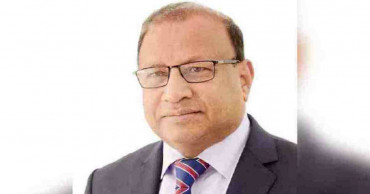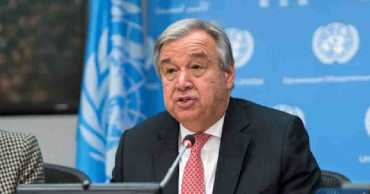Sustainable Development Goals
Local government representatives should earn dignity by their work for people: LGRD Minister
LGRD Minister Md. Tazul Islam on Thursday said local government institutions need to be accountable to people by providing better services to the community and the local representatives should earn dignity by their work for people.
“Capacities of the local government institutions (LGIs) of Bangladesh, their accountability and transparency have increased to achieve the Sustainable Development Goals (SDGs) by 2030 after the successful implementation of the 5-year-long “Efficient and Accountable Local Governance (EALG)” project. Good practices should be replicated,” he said.
The minister while speaking at an event titled “Stakeholders’ Conference on Local Governance: Progress, Learning and Way Forward” organized by the Local Government Division (LGD) of the ministry and the United Nations Development Programme (UNDP) at the Bangabandhu International Conference Center (BICC).
Addressing the conference as a special guest, Sudipto Mukerjee, Resident Representative of UNDP Bangladesh said EALG project has been working with the local government for the last five years to localize SDGs and build the capacity of Union Parishads and Upazila Parishad and provide policy support to the government for establishing effective local government systems, leaving no one behind.
He thanked Switzerland and Denmark for their support to implement the project and stressed the importance of continuing the support to the local government.
Read: LGRD Minister directs WASA to fix water price in capital rationally
Nathalie Chuard, Ambassador, Embassy of Switzerland said, “In relation to strengthening local governance in Bangladesh, we work with the government and development partners to ensure transparency, accountability, efficiency and inclusivity so that no one is left behind.”
“One of the key lessons we learned from EALG is that coordinated development planning and monitoring by the local government is crucial to ensure effective and optimum utilization of scarce resources and also avoid overlapping of activities,” she added.
Earlier, Md. Mozammel Haque, Programme Analyst, UNDP Bangladesh, presented the keynote paper on EALG Project and its Key Achievements.
Among others, Mohammed Mezbah Uddin Chowdhury, Secretary, Local Government Division, Shariful Hoque, Project Coordinator of the EALG Project, Deputy Director of Local Government from nine districts; Chairman & Vice Chairman of Upazila Parishads and Chairman of Union Parishads; Upazila Nirbahi Officers also spoke.
With support from the Embassy of Switzerland and Denmark, the Efficient and Accountable Local Governance (EALG) project of the Local Government Division and UNDP has been implemented in 251 UPs and 18 UZPs under nine districts.
3 years ago
UN maintains strong relationship with Bangladesh: Brandt
Executive Board President of UNDP, UNFPA and UNOPS Yoka Brandt has said the UN has a “strong relationship” with the government of Bangladesh and wants to further build on that to facilitate the achievement of the Sustainable Development Goals by 2030.
“We are here to see how we can work together more efficiently to that end, especially as the country is poised for LDC graduation,” said Brandt, also Permanent Representative of the Kingdom of The Netherlands to the UN.
A high-level delegation of the Executive Board of UNDP (United Nations Development Programme), UNFPA (United Nations Population Fund) and UNOPS (United Nations Office for Project Services) visited Bangladesh on a week-long mission to see the projects implemented by the UN and met the government.
Read: KOICA for strengthening community resilience progs in Bangladesh’s flood-prone regions
Led by the board’s President Yoka Brandt, the delegation arrived in Dhaka on June 25 and left on July 1, according to UNDP.
Foreign Secretary Masud Bin Momen said the UN has been a strong development partner for Bangladesh, and this mission is giving the scope to review and evaluate areas that need to be focused.
“It is a very timely visit. The UN has been a partner of the Government and the people of Bangladesh since 1971, and this mission will allow us to take stock of where we stand and guide our future interventions,” said UN Resident Coordinator Gwyn Lewis.
3 years ago
FBCCI: Tourism must grow enabling Bangladesh to achieve SDGs
The achievement of sustainable development goals by 2030 will be jolted unless a vigorous growth of tourism in the country, said the Federation of Bangladesh Chambers of Commerce and Industry on Monday.
The FBCCI Standing Committee on Tourism Development (Inbound, Outbound, Domestic & Civil Aviation) stated this at its first meeting at its office here.
“At least 6 goals of the SDGs are directly and the rest are indirectly related to tourism. Therefore, if tourism is not flourished, the achievement of sustainable development goals by 2030 will be hampered,” the apex business association said.
Also read: Any rise in power, gas tariff to be suicidal: FBCCISpeakers at the meeting, meanwhile, said some 109 sectors are directly and 1100 sub-sectors indirectly linked with the tourism industry. Every single tourist creates 10 direct and 35 indirect employment opportunities.“Therefore, tourism should be treated as a priority sector” they demanded.Tour operators urged the government to officially announce the country open for foreign tourists as the government declared for overseas businesspeople.
Read Self-reliance in seed production essential for food security: FBCCIThey also demanded the resumption of the “on-arrival visa” facilities to encourage foreign tourists to come to Bangladesh.During the meeting, businesspeople called for issuing licenses to tour operators, recognizing them as exporters, easing the process of remitting money overseas, bringing tourist destinations under the tourism ministry, and ensuring security.
Speaking at the meeting FBCCI Senior Vice President Mostofa Azad Chowdhury Babu said the tourism Industry lacks skilled manpower. The industry may hire experienced managers and other staff from Sri Lanka to deal with the problem.
Also read: FBCCI President urges Canadian companies to invest in Bangladesh’s waste managementRecognizing the government's interest in the tourism sector Vice President MA Momen emphasized securing tourist spots.The coordination between public and private efforts has to be further enhanced, he added.Vice President Md. Amin Helaly called for developing the standard of hospitality services by undertaking skill development programs.
Read FBCCI to boost business with MexicoFBCCI director Syed Moazzem Hossain said the sector must work on compliance, identifying tourism products and country branding as well as rationalizing hotel, motel, and resort fares.FBCCI Director Amzad Hussain informed the meeting that currently, the Tourism sector contributes 3.5 to 4 percent to the GDP. This contribution has to be raised to 10 percent. Therefore, a coordinated course of action has to be formulated and implemented accordingly.The former CEO of Bangladesh Tourism Board Akhtaruz Zaman Khan said that the BTB should incorporate FBCCI representation to bring the private sector demand into consideration.
Read Brand Bangladesh in a new way, FBCCI president urges entrepreneursThe Director in Charge of the standing committee M.G.R. Nasir Majumder assured that the FBCCI would continue to provide maximum assistance for the development of the tourism industry.The meeting was presided over by the chairman of the standing committee Taufiq Uddin Ahmed.Co-Chairman and the members of the committee, FBCCI Director Harun Or Rashid, and Secretary-General Mohammad Mahfuzul Hoque were also present at the meeting.
Read Abolish supplementary duty on locally-produced goods: FBCCI president
3 years ago
KOICA to help generate statistics to indicate progress on SDGs
A knowledge-sharing webinar on strengthening statistical capacity of Bangladesh, focusing on indicators relating to the SDGs (sustainable development goals) was held virtually on Tuesday.
Korea International Cooperation Agency (KOICA) in collaboration with Statistics and Informatics Division (SID) and Bangladesh Bureau of Statistics (BBS) under Ministry of Planning hosted the event.
Challenges such as, production of disaggregated and frequent statistics by age, sex, disability and sub-national level, comparability of data, availability of baseline data, conducting a large number of new surveys, technical support availability for regular monitoring, modern technology, etc. still persist that calls for a more restructuring, the webinar emphasised.
Young-Ah Doh, Country Director, KOICA Bangladesh Office, Mohammad Tajul Islam, Director General, Bangladesh Bureau of Statistics, Muhammad Mesbahul Alam, Additional Secretary, Statistics and Informatics Division, among other officials of the government of Bangladesh joined the virtual event.
Read: KOICA takes project on road safety in Bangladesh through ITS
Bangladesh’s standing in big data usage has highly advanced, namely, smart national ID Card database, COVID-19 vaccine registration, population census 2011 database, E-Passport integrated with NID database, national household database, 100 million births registered electronically, etc.
4 years ago
SDGs: PM says Bangladesh in top form for prudent planning
Bangladesh has been one of the top three performers on the Sustainable Development Goals (SDGs) Index due to the government’s prudent planning with specific directions, said Prime Minister Sheikh Hasina on Tuesday.
“We’ve taken proper planning with specific directions, and we’re moving ahead in a planned way for implementing the SDGs and included those in the [8th] Five Year Plan," Sheikh Hasina said.
She said this when Planning Minister MA Mannan, in the beginning of the weekly Ecnec meeting, informed the Prime Minister about Bangladesh's success in remaining there on top three positions in SDGs’ implementation.
Read: Live up to promises to ensure SDG benefits for marginalised: PM
Keeping the country’s development in mind, Hasina said, Awami League in its election manifesto stated various goal-oriented measures.
"We’ve been taking effective measures to implement those since assuming office and that’s why Bangladesh has been in the top three countries in implementing the SDGs,” she said.
The Prime Minister said Bangladesh was in an advanced position in implementing the Million Development Goals (MDGs). “We’re approaching the SDGs the same way.”
Read: Report: Bangladesh among 3 top performers in sustainable development
Hasina gave all credits for the achievements to collective efforts of all that included the people of the country, party leaders and activists alongside civil and military officials and members of law enforcement agencies.
The Prime Minister thanked all concerned for accepting the decisions taken by her government and working sincerely for their execution.
On one side the government has to face the Coronavirus fallouts and keep the country’s economy moving on the other, she said, adding, “This has been possible due to the collective efforts of all."
The Prime Minister said Bangladesh is also dealing with lots of problems, including the manmade ones, as it did in the past.
Pledging to take the country ahead facing all the odds and obstacles, she said, adding: “Bangladesh is marching ahead and will surely keep moving on.”
The Prime Minister also unveiled the cover of a memorial book titled “Durjog Jhuki Hrashe Bangabandhu” (Bangabandhu in Disaster Risk Reduction)” while joining virtually a meeting of the Executive Committee of the National Economic Council (Ecnec) from her official residence Ganobhaban while other concerned got connected with it from NEC conference room.
Unveiling the cover of the book, she said that measures taken by Father of the Nation Bangabandhu Sheikh Mujibur Rahman in reducing the risks of disasters is exemplary for not only Bangladesh, but for any disaster-prone area in the world.
She said the people of Bangladesh could face any sort of storm, tidal surge, cyclone and natural disaster as Bangabandhu taught Bangladeshis in this regard.
Describing the measures taken by Bangabandhu in facing any disaster as a milestone for Bangladesh, Hasina said her government is taking every measure to face disasters following the footsteps of Bangabandhu.
“We have been able to protect the lives of the people (from natural disasters) and got confidence to face any natural calamity from the measures and plans taken by the Father of the Nation,” she added.
4 years ago
Report: Bangladesh among 3 top performers in sustainable development
Bangladesh and two other countries – Afghanistan and Cote d’Ivoire have progressed the most on the SDGs Index score since the adoption of the 2030 global agenda in 2015, according to the Sustainable Development Report 2021.
The report was launched on Monday by the Sustainable Development Solution Network (SDSN).
The report said East and South Asia has progressed more on the SDGs than any other region, both since 2010 and since the adoption of the goals in 2015.
By contrast, the three countries that have declined the most are Venezuela, Tuvalu and Brazil.
READ: Utilise SDGs as a framework to address youth agenda: Dialogue
However, the global average SDG index score has decreased for the first time since the adoption of the SDGs in 2015. The global decline in performance, including in OECD countries, was driven to a large extent by increased poverty rates and unemployment in 2020.
In the report, Bangladesh has been ranked 109th with an overall score of 63.5 in the 2021 SDG index.
Finland has been ranked 1st with 85.9 score. The four other countries in the top five positions are Sweden (85.6), Denmark (84.9), Germany (82.5) and Belgium (82.2).
READ: SDGs: 'Youth voice missing in policy process'
In South Asia, Bhutan (70) is in 75th position, Maldives (69.3) in 79th, Sri Lanka (68.1) in 87th position, Nepal (66.5) in 96th, India (60.1) in 120th, Pakistan (57.7) in 129th, and Afghanistan (53.9) in 137th position.
4 years ago
SDGs: 'Youth voice missing in policy process'
The youths should be involved beyond passive consultation processes and encouraged to actively provide inputs to local and national Sustainable Development Goals (SDGs) accountability mechanisms.
But the voice of the young people, who make up more than a third of the country's population, is missing in the implementation of the SDGs.
Experts made the observations at the dialogue "Accountability for SDG Implementation: Local Perspectives and Youth" organised by Citizen's Platform for SDGs Bangladesh and ActionAid Bangladesh Sunday.
"Among the 122 indicators of SDGs, eight are directly focused on youth employment, various injustice, educational rights and others. Undoubtedly, we need to pay attention to the assessment, evaluation and voice of the youth," said Dr Debapriya Bhattacharya, convenor of Citizen's Platform.
ActionAid Country Director Farah Kabir said: "Though Bangladesh prepared two voluntary national reviews in 2017 and 2020 respectively to assess the implementation status of the SDGs, youth and marginalised communities were not fully involved in the process."
"So, the voluntary local reviews need to be prepared through the district, sub-district and community levels, especially involving young men and young women below the age of 35 years and who have been left behind lately due to the pandemic."
4 years ago
Let's work together to defeat COVID-19: UN chief
UN Secretary-General António Guterres has called for working together to defeat COVID-19 and ensuring that digital technologies are a force for good that help achieve the Sustainable Development Goals.
"On World Telecommunication and Information Society Day, let us commit to work together," he said adding that they should not leave anyone behind.
The United Nations, through a Roadmap for Digital Cooperation and the vital work of the International Telecommunication Union, aims to make the transformation equitable, safe, inclusive and affordable for all, with full respect for human rights.
Also read: Restore planet amid pandemic: UN chief
The UN chief made the remarks in a message marking the World Telecommunication and Information Society Day that falls on May 17.
Guterres said digital technologies sustain life, work, health and learning for billions of people.
Also read: Let's plant seeds for sustainable future: UN chief
In the face of COVID-19, he said, businesses, governments and the digital community have proven resilient and innovative, helping to protect lives and livelihoods. "These challenging times have accelerated the transformation everywhere."
Yet 3.7 billion people – nearly half the world’s population – remain unconnected to the Internet; and of these, the majority are women, said the UN chief.
Also read: UN chief lauds Bangladesh’s Covid mitigation efforts
"They, too, must be included if we are to make the possibilities of 5G, artificial intelligence, the Internet of Things, digital health and other technologies truly transformative and sustainable," he said.
"We must also protect against the dangers of digital technologies, from the spread of hatred and misinformation to cyberattacks and the exploitation of our data," Guterres added.
4 years ago
NGOs urged to design plan of action taking Covid-19 into consideration
Speakers at a programme called upon partner NGOs of BRAC to chalk out a plan of action for achieving the Sustainable Development Goals (SDGs) and improving the condition of disadvantaged people taking the Covid-19 situation into consideration.
They made the call while addressing a partner orientation workshop held virtually on Monday.
Also read:Webinar emphasises effective govt-NGO collaboration
BRAC organized the event to increase the capacities of its partner NGOs as well as highlight the future plan of action and recommendation.
Hasina Akhter Huq, Area Director of Humanitarian Crisis Management Programme (HCMP) of BRAC; Mohammad Ziauddin, head of admin, logistics and procurement of HCMP and others spoke at the event.
Md. Abdul Matin Shardar, head of Host Community Programme of HCMP, moderated the function.
Hasina Akhter Huq, in her address, said that their future plan of action should be designed giving priority to the issue of achieving the SDGs and improvement of conditions for disadvantaged people.
"Besides, we have to give importance to real and welfare-oriented activities so that the local community can judge those activities as their own. It will bring more dynamism to the activities in the future," she observed.
Also read:BRAC to increase capacities of partner NGOs
Over 50 representatives from six partner NGOs of BRAC attended the event.
The six NGOs are: Society for Health Extension and Development(SHED), Programme for Helpless and Lagged Societies (PHALS), Alliance for Cooperation Aids Bangladesh (AKLAB), Jago Nari Unnayan Sangstha (JNUS), NONGOR and Help-Cox’s Bazar.
The speakers stressed on carrying out advocacy activities and other campaigns through online platforms due to the prevailing Covid-19 situation.
Other issues such as maintaining the safeguarding matter for protection of employees, maintaining Donor and BRAC values, and more transparency and accountability regarding the implementation of projects came up for elaborate discussion at the event.
4 years ago
UNDP, BGMEA launch report measuring RMG's impact on SDGs
Although Bangladesh's Sustainable Development Goals (SDGs) Financing Strategy expects a 42% contribution from the private sector, no consolidated industry impact on SDGs has yet been reported.
While some individual factories produce sustainability reports, the appreciation of the magnitude of the impacts has so far remained outside of systematic studies and reporting, making it difficult to understand industry trends and align private sector efforts to government goals.
"In Bangladesh, the RMG sector not only contributes to economic development but also to SDG achievement. It provides employment; supports healthcare of the workforce; invests in up-skilling the workforce; adopts resource recycling; increasingly uses renewable energy," UNDP Resident Representative Sudipto Mukerjee said.
Also read: Explore new markets to sustain RMG industry: Commerce Minister
So, the United Nations Development Programme (UNDP), the Bangladesh Garment Manufacturers and Exporters Association (BGMEA), and the Global Reporting Initiative have taken the first step towards a consolidated industry approach to private sector sustainability reporting.
In the past months, 47 BGMEA member factories conducted sustainability self-reporting – translating their impact into the language of National Priority Indicators (NPIs) and SDGs.
The efforts of the factories were consolidated in the report – "A Pathway to Manage Private Sector Impact on Bangladesh National Priority Indicators (NPIs) & Sustainable Development Goals (SDGs)" – unveiled on Sunday.
Also read: Partnership crucial to achieve SDGs, national goals: FM
Also, the factories got a certificate of appreciation at the event for their contribution to NPIs and SDGs through sustainability reporting.
"With this report, we wanted to measure the readymade garment (RMG) industry's impact on SDGs to communicate with key stakeholders, such as the government, buyers, trade partners, and communities so that we can take action to support the country together," BGMEA President Dr Rubana Huq said.
"We hope to inspire more RMG factories and other industries to undertake sustainability reporting in the future as it is a key step in the journey of translating the private sector contribution to SDG financing into concrete achievements and future actions."
4 years ago

.jpg)

.jpg)

.jpg)
.jpg)






